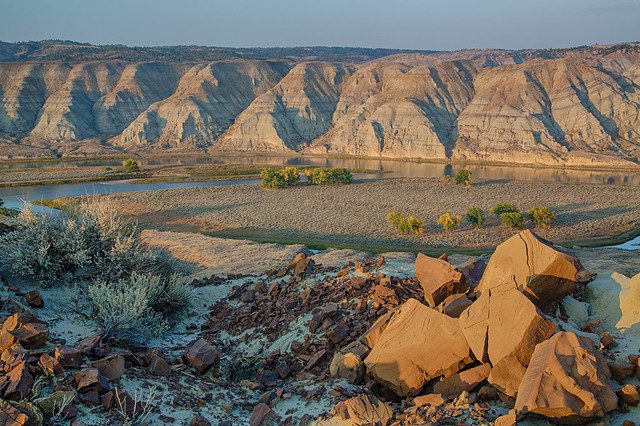


Pew Charitable Trusts: Central Montana’s Russell Country is characterized by varied, rugged landscapes. Pristine prairie, sliced by the Musselshell River, transforms to rough and craggy breaks approaching the Missouri River. One of the last places to be settled in the West, this sparsely populated section of the country remains almost as remote and wild as it was over 200 years ago. The Bureau of Land Management (BLM) has just published for public comment the long-awaited draft plan for managing some of this wild country. Unfortunately, the BLM’s recommendation continues the Trump administration’s unprecedented pattern of eliminating conservation protections for special areas in the region, opening up these special places to oil and gas development.
>>>Urge the BLM to take a balanced approach and protect some of these wild remote public lands from future development.
Lady Freethinker: Locked in lonely metal cages, poisoned, sliced open and burned—all for unreliable and needless experiments. This is the fate animals in clinical trials are forced, by law, to suffer in laboratories across the U.S. Now, in a landmark court case, Vanda Pharmaceuticals is taking legal action against the Food & Drug Administration (FDA) for trying to pressure the company into conducting cruel and inhumane trials of a new drug on innocent dogs, after which the animals would be mercilessly slaughtered or “sacrificed,” then carved up and their organs analyzed. Vanda Pharmaceuticals describes the nine-month, non-rodent toxicity studies it is fighting against—which involve animals, normally beagle puppies, being force-fed, injected or forced to inhale chemicals before being put to death—as the “unnecessary and unethical” routine killing of animals. The suffering and eventual slaughter of animals in research is unacceptable, and completely avoidable.
>>>Urge Acting Commissioner of the FDA Norman Sharpless to abolish nine-month, non-rodent toxicity studies that result in the pointless and painful deaths of hundreds of innocent dogs and other animals.
Rainforest Action Network: Millions of dollars in sweets are sold by companies like Hershey’s and Mars every year—with holidays like Easter and Halloween each netting millions apiece. What’s not so sweet is that too many of these tasty treats contain palm oil born of rainforest destruction. With commitments to “No Deforestation” but no adequate system in place to actually track where destruction is going down, candy makers continue to profit off of a bitter fate for rainforests, and for the tigers, orangutans, elephants and people who depend on them.
>>>Urge Hershey’s and Mars to establish proactive, transparent monitoring systems showing consumers where their palm oil is grown, the actions that they are taking to track deforestation and to intervene to keep forests standing.
Cause for concern…

- Global population of eight billion and growing: we can’t go on like this (Robin McKie, The Guardian)
- Climate change could spark a financial crisis: Democrat candidates warn Fed (John Lippert, InsideClimate News)
- Trump reverses water bottle ban in national parks (Amanda Mills, NationofChange)
- Men who eat “Western” junk food diet have lower sperm counts (Sam Nickerson, EcoWatch)
- “The biggest problem is greed,” says conservationist Jane Goodall in interview (Deutsche Welle)
Round of applause…

- Be a voice for the voiceless: This advocacy toolkit shows how you can lobby for pro-animal legislation (Animal Legal Defense Fund)
- China will hunt down ozone-killing chemicals (David Cyranoski, Nature)
- Activists occupy public spaces across U.K. demanding government action on biodiversity loss and emissions (The Ecologist)
- A retired teacher found some seahorses off Long Beach, then he built a secret world for them(Deborah Netburn, Los Angeles Times)
- VIDEO: Watch a rescued baby opossum’s amazing transformation (The Dodo)
Parting thought…
“Keep close to Nature’s heart … and break clear away, once in awhile, and climb a mountain or spend a week in the woods. Wash your spirit clean.” —John Muir